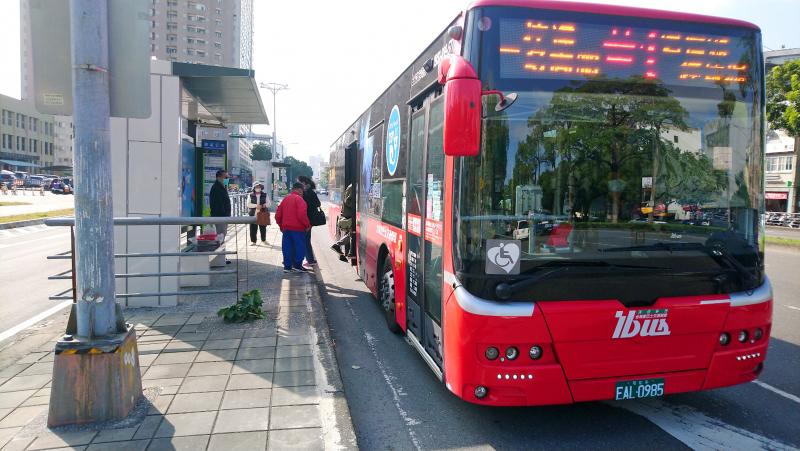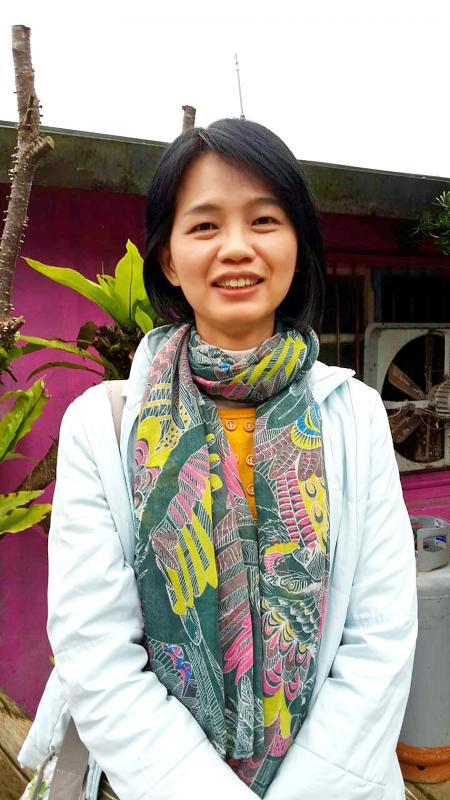Some key bus stops in Kaohsiung now let people waiting for a ride not just see their bus coming, but also “hear” it arriving. To make it easier for visually impaired people to travel by bus, Kaohsiung City Government’s Transportation Bureau said on Monday last week that it had finished installing 10 bus arrival audio announcement devices that can help city residents keep better track of their bus-waiting time and hail and board buses in good time, so that they can avoid missing the bus.
The Transportation Bureau has installed 10 bus arrival time audio announcement devices at certain bus shelters where a large number of people pass through or where visually impaired people frequently board buses, namely Chang Gung Memorial Hospital, Fongshan Bus Transfer Station, Kaohsiung Station, Fongshan Administration Center and the Kaoshiung Fruit and Vegetable Marketing Company.
Transportation Bureau Director-General Chang Shu-chuan said that these 10 bus arrival time audio announcement devices have been installed since September last year. When a bus is about to arrive, the devices automatically announce the name of the bus route and provide prompt and accurate information about its location and expected arrival time, so that people can ride the bus with no worries.

Photo: Huang Liang-chieh, Liberty Times 照片:自由時報黃良傑
A visually impaired man surnamed Tsai said that when waiting for a bus in the past, he had to call the Transportation Bureau to ask for real-time information, but now that there are spoken announcements at bus stops, he knows when a bus on a particular route is approaching.
In addition, to make it convenient for visually impaired people to use the Kaohsiung iBus mobile app, in October last year the bureau invited the Kaohsiung Chi-Ming Association, the Association of Blind Taiwan and delegates from the group for safeguarding and promoting the rights of people with disabilities to jointly evaluate the app. The bureau will require their suggestions to be included in future updates, so as to create a still more user-friendly environment for riding buses.(Translated by Julian Clegg, Taipei Times)
高雄某些主要公車站現在不僅讓等公車的乘客看見公車,也讓他們能「聽見」公車到站。高雄市府交通局為照顧視障民眾搭乘公車,上週一宣布完成建置十座公車到站語音播報設備,讓市民更能有效掌握候車時間,即時招手搭乘,避免錯過公車。

Photo courtesy of Chang Shu-chuan via CNA照片:中央社,張淑娟提供
交通局陸續於長庚醫院、鳳山轉運站、高雄火車站、鳳山行政中心、果菜公司等人潮較多或視障者較常搭乘的候車亭,建置十座公車到站語音播報設備。
交通局長張淑娟說,這十座公車到站語音播報設備,陸續自去年九月至今完成建置,當公車即將進站時,會自動播報公車路線名稱,提供即時、正確的公車動態到站資訊,讓民眾搭車嘸免驚!
視障朋友蔡先生表示,以前等公車的時候,只能透過打電話給交通局詢問公車即時動態,現在站位有語音播報提醒,用聽的就可知哪一條路線即將進站。
此外,為便利視障朋友使用「高雄愛巴士」行動應用程式,交通局去年十月邀集高雄市啟明協會、台灣盲人重建會及身心障礙者權益保障推動小組委員共同檢視此應用程式,將需求納入未來改版項目,更友善公車使用環境。
(自由時報)

A: Hey, didn’t you go to the opening of the Mitsui Shopping Park LaLaport Nangang last week? B: Yeah, there are about 300 shops, including the first overseas branch of Japan’s Mahou Dokoro — a famous Harry Potter-themed store. A: Wow, I’ve always wanted to get a magic wand. B: There are also a bunch of great restaurants, such as Smart Fish hotpot restaurant. A: I wish I had Harry Potter’s “apparition” and “disapparition” magic, so I could teleport to the mall right now. A: 你上週不是有去LaLaport南港的盛大開幕嗎?有什麼特別的? B: 那裡有多達300家專櫃,包括魔法之地的海外首店——它可是日本知名的《哈利波特》專賣店。 A: 哇我一直想買根魔杖。 B: 另外還有各式各樣的美食,像是林聰明沙鍋魚頭。 A: 真希望我也有哈利波特的「現影術/消影術」魔法,能瞬間移動到商場去! (By Eddy Chang, Taipei Times/台北時報張迪)

When it comes to movies, some people delight in watching spine-chilling horror films. Surprisingly, apart from containing a few scares, horror movies may also offer an unexpected __1__. According to a study, watching 90 minutes of a scary movie can burn an average of 113 calories, which is roughly __2__ to taking a 30-minute walk. Researchers from the University of Westminster carried out an experiment in which they __3__ participants’ oxygen intake, carbon dioxide output, and heart rates while they were watching horror movies without any distractions. The results revealed that physiological responses to fear play a crucial role

Bilingual Story is a fictionalized account. 雙語故事部分內容純屬虛構。 Echo pulled out a worn and tattered shoe box under father’s large oak desk. “Mariko, what should we do with these family photos?” Mariko stared at the old box with a slightly hurt expression, and then blankly at the photos. “Throw them in the garbage pile. . . along with that old, ratty box,” she murmured. She resented that her father had not cared enough to find a nicer home for the family photos. “Father never really cared about me anyway.” Echo’s emotion sensor detected sorrow. ”Mariko, that is

Dos & Don’ts — 想想看,這句話英語該怎麼說? 1. 你覺得這部電影怎樣? ˇ What do you think of the movie? χ How do you like the movie? χ How do you think of the movie? 註︰What do you think of = What is your opinion of。 think 的受詞是 what,不能用 how。 2. 你認為哪一個歌星唱得最好? ˇ Which singer do you think is the best? χ Do you think which singer is the best? 註︰英語中 which singer 似乎是 do you think 的受詞,實則 do you think 是插入語,其他例子如下: 你以為他喜歡誰? Who do you think he likes? 你以為我住在哪裏? Where do you think I live? 你想我昨天在公園裏碰到了誰? Whom/Who do you think I met in the park yesterday? 3. 他不論到什麼地方,總是帶著一把雨傘。 ˇ No matter where he goes, he